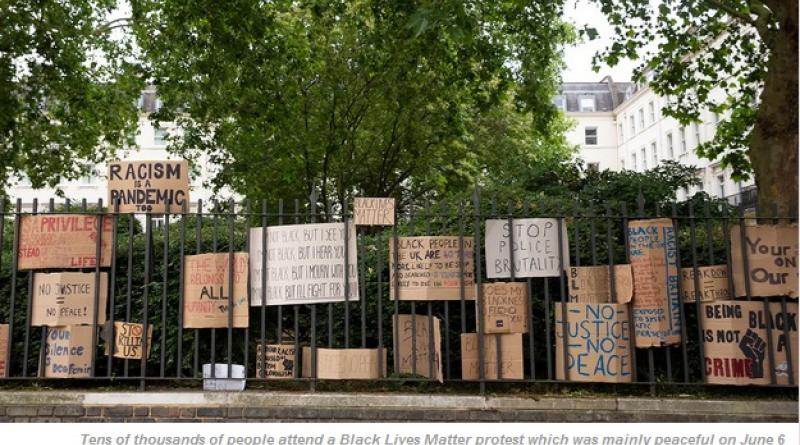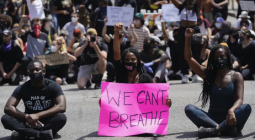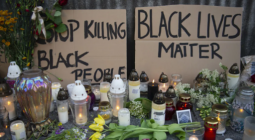How to Be an Effective Online Ally for the Social and Environmental Justice Fight

As climate activists, we can't fight the climate crisis without considering the systemic impacts that environmental racism and White supremacy have on the frontline communities most affected by pollution and our warming world.
Over the last few months, many around the world have taken time to recognize and educate themselves about the fight against police brutality, racism, and inequity. While this fight has been going on for decades, it's time for White activists, in particular, to step up our game and do everything we can to become effective allies to those leading the fight for social and environmental justice.
You've probably seen articles and social media posts about supporting Black Lives Matter and environmental justice, but what can we do online to help amplify the voices of these organizers – and how can we stand with them?\
Do a Social Media Audit and Reconsider Who You Follow
As the movement for social and environmental justice continues, it's important to pay attention to the voices and media outlets you're consuming information from. Take a few minutes to look at your social media feeds – do you follow people of color and diverse voices? Do you follow credible news sources?
Take a look at what you've posted so far and think about why you posted. As allies, we can help the movement by centering our posts and online actions around supporting the activists and organizers on the ground. Think or ask about how you can best amplify these causes – for many that could mean retweeting or reposting, educating your followers, or even by directing followers to donation or petition pages.
Next, take a look at who you follow. It can be easy to get stuck in a social media bubble, where your social feed will filter out opinions you may not necessarily agree with. By continuing to audit your social media and expand your range of news sources or pages you follow to have varying opinions or backgrounds, you ensure you have a well-rounded news feed and could even hear about a news story that you may not have known about before!
For many environmental justice fights around the US and world, local news outlets and activists may be the ones covering the story first. By taking a look at our follower lists, it gives us space to recognize any information gaps! Check out the accounts of people you trust to follow useful resources and activists.
Need some recommendations to start you off? Here are some of the top climate scientists and youth activists we suggest you follow on social media.
Challenge Yourself and Others to Continue Learning
It's okay not to know everything. In fact, it's completely normal.
One of the best parts of being a climate advocate is that we continue to learn and grow with the climate movement and science. To protect our air, water, and land from pollution, we have to stay up to date with the newest science and solutions – it's the same thing when advocating for social and environmental justice!
For many, this means keeping up to date on social media and in the news with what protests are happening and why, how we can support them, and what local organizations are doing to defend their communities. It also means trying to keep an ear out for the stories that major outlets aren't covering extensively.
Take the recent victory in the fight against the Atlantic Coast Pipeline for example. Local environmental justice groups in West Virginia, Virginia, and North Carolina had been fighting for years against the pipeline. When it was canceled a few weeks ago, activists celebrated, but the story never seemed to get the same level of attention as the latest tweet from the White House.
Social media gives us the opportunity to learn from others with varied experiences and gain resources to information that can make us better activists.
Expect to Make Mistakes and Learn to Listen
We will all make mistakes. It's a part of continuing to educate ourselves and growing as an ally and activist. Even the most experienced advocates have said the wrong thing or made a mistake in their time.
For many of us, especially White climate activists, these may be relatively new concepts, but we must make the fight against racism our fight. Take a look back at what you've posted before and learn from any past mistakes, using this moment to learn what went wrong and share what you learned with others. By educating yourself, you can help others who may be experiencing similar mistakes or have questions.
Additionally, the best way to learn about the impacts of systemic racism on frontline communities being impacted by police brutality or climate change is to listen. Give Black activists and people of color an opportunity to tell their stories and give yourself time to reflect on their experiences. It may (and probably will be) uncomfortable in some moments but it's necessary to make progress in a movement where we can fight together for long-awaited justice.
Use Your Platform and Following to Amplify Diverse Voices
Whether you have a big social media following, only follow close family and friends on social media, or don't have social media accounts at all – use the platform or online environment you have to amplify the voices of Black activists and people of color.
It can be as simple as sending an email to close friends or retweeting posts from local organizers. Sharing information from those on the front lines to those who trust and follow you not only helps local activists but can help educate others!
For many, you're a trusted messenger. What does that mean? You can read more about it in one of our past blogs, but here's a quick definition from Boston University:
"People believe people whom they trust, and they're more likely to act based on the recommendation of that influential other person."
Your family, friends, and followers trust you – use that privilege as an opportunity to educate them and amplify the voices of those leading the social and environmental justice fight!
Want to Learn More About Climate Activism and Environmental Justice?
Feeling inspired to join the movement for environmental and climate justice? Sign up to learn more by becoming a Climate Reality Leader.
By signing up for one of our Climate Reality Leadership Corps trainings, you'll learn about fossil fuel pollution and climate impacts on low-income families and communities of color, and how to build the broad, inclusive, and powerful coalitions necessary to fight back.
Join former Vice President Al Gore and an all-star lineup of environmental justice leaders, climate scientists, business leaders, and more to learn how to fight for a just, healthy future for all.
Aug. 02, 2020





